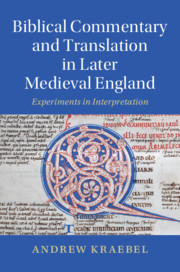Book contents
- Biblical Commentary and Translation in Later Medieval England
- Cambridge Studies in Medieval Literature
- Biblical Commentary and Translation in Later Medieval England
- Copyright page
- Dedication
- Contents
- Figures
- Acknowledgments
- Abbreviations and Conventions
- Introduction
- Chapter 1 Interpretive Theories and Traditions
- Chapter 2 Eclectic Hermeneutics: Biblical Commentary in Wyclif’s Oxford
- Chapter 3 Richard Rolle’s Scholarly Devotion
- Chapter 4 Moral Experiments: Middle English Matthew Commentaries
- Epilogue: John Bale’s Dilemma
- Book part
- Notes
- Bibliography
- Index of Manuscripts
- General Index
- Cambridge Studies in Medieval Literature
Epilogue: John Bale’s Dilemma
Published online by Cambridge University Press: 22 February 2020
- Biblical Commentary and Translation in Later Medieval England
- Cambridge Studies in Medieval Literature
- Biblical Commentary and Translation in Later Medieval England
- Copyright page
- Dedication
- Contents
- Figures
- Acknowledgments
- Abbreviations and Conventions
- Introduction
- Chapter 1 Interpretive Theories and Traditions
- Chapter 2 Eclectic Hermeneutics: Biblical Commentary in Wyclif’s Oxford
- Chapter 3 Richard Rolle’s Scholarly Devotion
- Chapter 4 Moral Experiments: Middle English Matthew Commentaries
- Epilogue: John Bale’s Dilemma
- Book part
- Notes
- Bibliography
- Index of Manuscripts
- General Index
- Cambridge Studies in Medieval Literature
Summary
The relationship between scholastic biblical commentary and translation recovered in the foregoing chapters posed problems for reformist Tudor writers, who sought precedents for their vernacular biblicism in Middle English writings. This Epilogue focuses on the work of John Bale, describing the tensions in Bale’s commitment to cataloguing the literature of medieval England, including the commentaries studied here, and his desire to identify medieval English translators as early coreligionists. Although Bale is able to find a place for commentary (even some medieval scholastic commentary) in reformist biblical reading, his approach to vernacular exegesis and translation leads him to obscure the place of medieval biblical translation in the larger project of scholastic exegesis. The resulting distinction between the work of commentary and translation has had a long scholarly afterlife, one which this study seeks to set right.
Keywords
- Type
- Chapter
- Information
- Biblical Commentary and Translation in Later Medieval EnglandExperiments in Interpretation, pp. 176 - 187Publisher: Cambridge University PressPrint publication year: 2020

